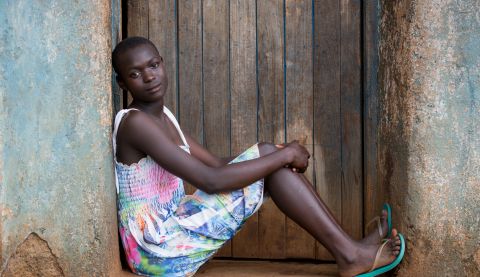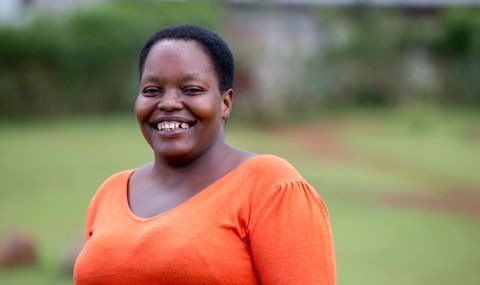What's the link between period poverty and violence?
31 May 2018
Find out how period poverty is affecting women and girls around the world - including the shocking links between period poverty and violence that might surprise you.

Find out about the link between period poverty and violence, affecting girls like Lavender. Photo: ActionAid
Lavender lives in Nyarongi, one of the poorest parts of Kenya. Some families in her area have to choose between buying food and sanitary towels. They struggle to afford the vital sanitary protection or underwear that girls need to manage their periods with dignity.
When girls don’t have sanitary towels, they often don’t want – or simply can’t - go to school.
They worry they’ll stain their uniform or get blood on their classroom chair.
It’s uncomfortable enough when accidents like this happen at home— let alone at school, where there are plenty of other children around to tease you. And when there isn't a safe, private toilet, or clean water to use at school, girls feel insecure and uncomfortable going to the toilet during menstruation.
Period poverty can expose girls to violence
Girls who fall behind with their studies are more likely to drop out of school completely.
Without the support of teachers and school friends, and without the knowledge and confidence to stand up for their rights, girls become increasingly vulnerable.
They are at greater risk of exposure to sexual exploitation and abuse. One in three girls in Kenya has experienced sexual violence.
When girls aren't in school, they're more likely to be subjected to child marriage or early pregnancy.
This can have a huge impact on their health and wellbeing. Without the knowledge or power to make decisions about safe sex, they’re at a higher risk of contracting sexually transmitted infections.
And when girls give birth at a young age, this can cause complications that have a devastating impact on their health and wellbeing and can last for the rest of their lives.

An empty classroom at a school in Nyarongi. When girls can't access clean and effective sanitary products, they miss out on school and are more likely to drop out altogether.
ActionAid is making sure that periods don't hold girls back
In Nyarongi, we’re working with local women’s groups to help educate girls about periods, sex, and pregnancy, so they’re more informed about their bodies.
Through local girls' forums, we're providing girls with the information they need so they know what to expect when their period starts. We’re giving them the confidence to manage their periods with dignity and take care of their menstrual hygiene.
12-year-old Judy explains:
During our girls’ forum our teacher explained to us that if you see your period, you should not be scared, we can use the pads, change it in the evening and take a shower.”
But information isn’t enough.
The Nyarongi Women’s Network, supported by ActionAid, has started an initiative to tackle period poverty. They’ve launched a farming project that helps provide additional income for families that can be spent on basic necessities, like sanitary towels.
Irene, the Chairperson of the Network, told us:
[The children] can make their small market garden at home to make some funds to buy essentials. When they have a small market garden, the girls can go to the market and get sanitary towels.”
The group are also working with local teachers to make sure that girls have access to safe, clean sanitary products in school. Through their tireless work, Irene and the Nyarongi Women's Network are helping to make sure that periods don't hold girls back.

Irene is the Chairperson of the Nyarongi Women's Network. She's helping girls in her local community get access to sanitary pads. .
How you can help end period poverty and violence
We're supporting women and girls in some of the poorest parts of the world so they have the resources they need to manage their periods with dignity.
By donating as little as £3 a month to support our work, you can help make sure that young girls have the knowledge, skills and resources to take control of their bodies, and manage their periods safely and with dignity.


